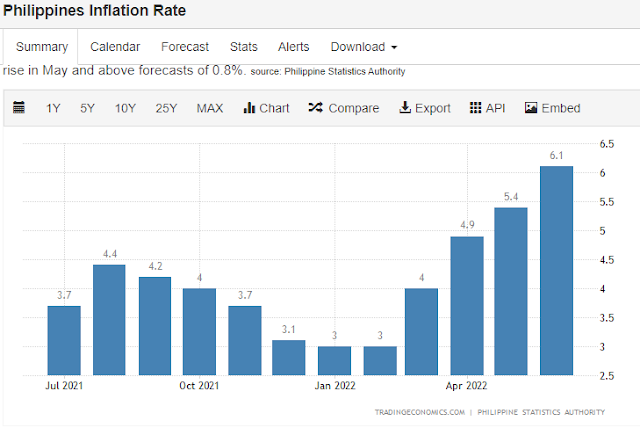The inflation rate of the Philippines almost doubled from June 2021 from 3.7 to 6.1 in its current reading July 2022 according to PSA.
In order for sustain this rise of inflation, the monetary authority (like the central bank) takes the necessary steps to manage the money supply and credit to keep inflation within permissible limits and keep the economy running smoothly.
While the Bible does not use the word inflation, the concept of sustained price increases—and the misery they cause—exists in the pages of Scripture. For example, when the Arameans attacked Israel during the days of Israel’s King Jehoram, the Israelites experienced extreme inflation. The siege of the capital city led to a lack of goods and, as we would say today, out-of-control inflation: “There was a great famine in the city [of Samaria]. The siege lasted so long that a donkey’s head sold for eighty pieces of silver, and a cup of dove’s dung sold for five pieces of silver” (2 Kings 6:2, NLT). Inflation was so bad that food and fuel were unaffordable—and people were eating donkey’s heads and burning dove’s droppings if they could get them. *1
Under those harsh conditions, King Jehorham was ready to give up and surrender to Aram. In fact, he blamed the situation on God rather than on his own wickedness: “This disaster is from the Lord ,” he said (2 Kings 6:33). But Elisha the prophet gave him hope to hold out one more day: “Elisha replied, ‘Listen to this message from the Lord! This is what the Lord says: By this time tomorrow in the markets of Samaria, six quarts of choice flour will cost only one piece of silver, and twelve quarts of barley grain will cost only one piece of silver’” (2 Kings 7:1, NLT). God’s promise was that prices would drop dramatically, indicating an end to the siege.
So, inflation has been around for a long time, and the examples in Scripture show it is exacerbated by war, disruption of supply chains, and lockdowns (in the form of sieges). Another factor contributing to inflation is greed, which can take the form of price gouging, dishonest weights and measures, etc. The Bible repeatedly condemns dishonest gain: “Do not have two differing weights in your bag—one heavy, one light. Do not have two differing measures in your house—one large, one small. You must have accurate and honest weights and measures” (Deuteronomy 25:13–15; cf. Proverbs 20:10; Ezekiel 45:10; Micah 6:10–11).
The problem with dishonest measures is that, if you pay $10.00 to get 10 oz of a product, but the seller only gives you 8 oz, then the purchasing power of your money has decreased. In reality, you’re paying not $1.00/oz but $1.25/oz—instant inflation. The Bible’s injunctions against dishonest weights and measures, if followed, would help curb inflation.
Global inflation is predicted to occur during the tribulation, as part of God’s judgment on earth: “When the Lamb opened the third seal, I heard the third living creature say, ‘Come!’ I looked, and there before me was a black horse! Its rider was holding a pair of scales in his hand. Then I heard what sounded like a voice among the four living creatures, saying, ‘Two pounds of wheat for a day’s wages, and six pounds of barley for a day’s wages, and do not damage the oil and the wine!’” (Revelation 6:5–6). In this judgment, the luxuries are still available, but the necessities will be in short supply. Significantly, this third Horseman of the Apocalypse follows the bringer of war (Revelation 6:3–4).
The reality of inflation should remind all of us that riches are fleeting: “Cast but a glance at riches, and they are gone, for they will surely sprout wings and fly off to the sky like an eagle” (Proverbs 23:5). All of us have, at one time or another, felt like the people in Haggai’s day: “You earn wages, only to put them in a purse with holes in it” (Haggai 1:6). Our trust should be in something more reliable. Paul enjoined the rich not “to put their hope in wealth, which is so uncertain, but to put their hope in God, who richly provides us with everything for our enjoyment” (1 Timothy 6:17). Rich or poor, we can store up treasures in heaven (Matthew 6:19–21). We have a surer hope than the shrinking value of money: “Those who trust in their riches will fall, but the righteous will thrive like a green leaf” (Proverbs 11:28).
*1. https://www.gotquestions.org/Bible-inflation.html
Jack speaks at conferences across the Philippines on topics such as family finances, and personal and professional growth.
You can contact Jack Marbida through his social media accounts or email him at papajackph@gmail.com.
Cheers!





.webp)
.webp)


.webp)
0 Comments